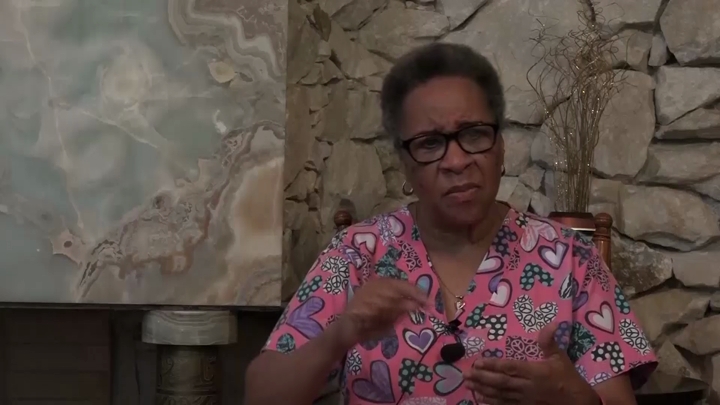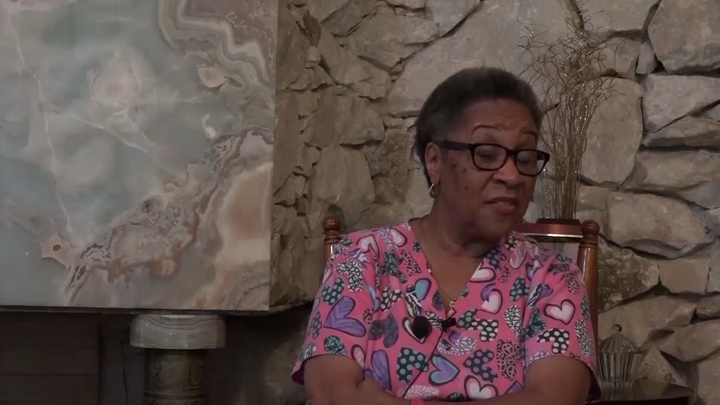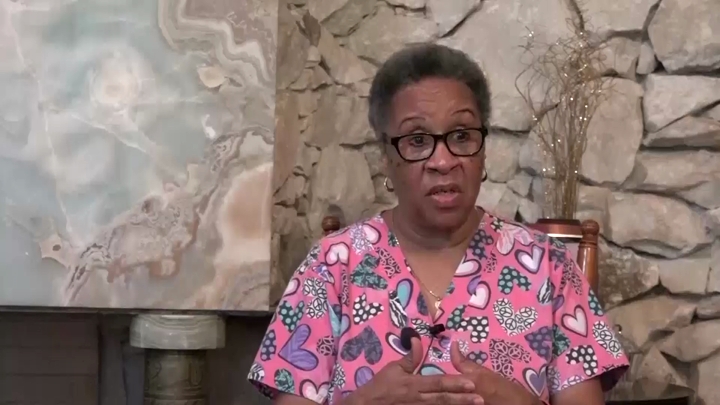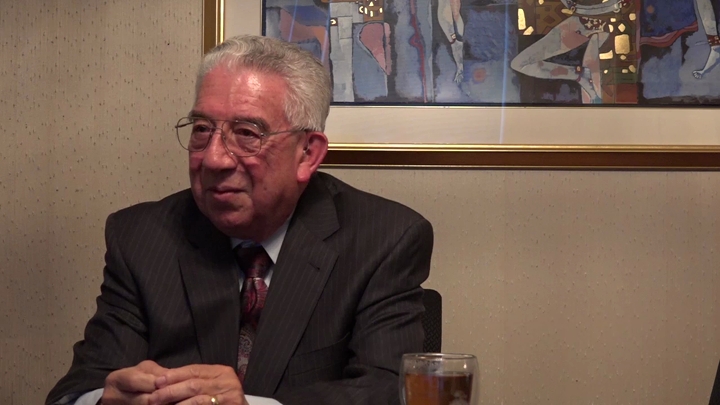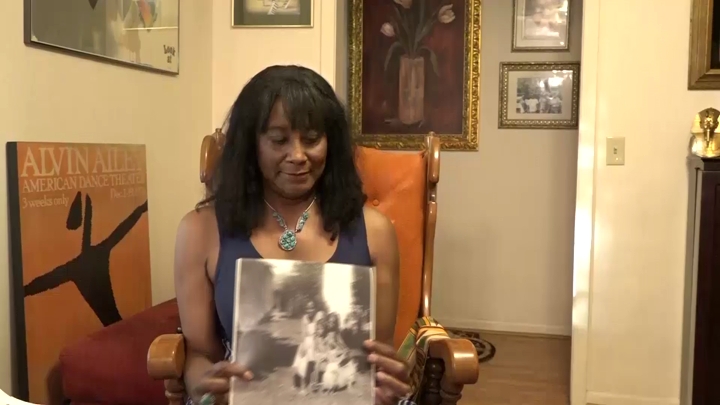Abdullah / Becoming a Muslim
sign up or sign in to add/edit transcript
Interviewer: When did you leave SFA? Helena Abdullah: I left SFA—I got married in August of 1970, so my last semester was probably the spring of 1969 before the marches and everything. The fall of 1969, I was not at SFA and I know that when 1970 rolled around, January, I was not at SFA because I got married that August. Interviewer: You got married in Nacogdoches? Helena Abdullah: Yeah, got married here but I was still working with the movement. I worked with the movement up until the spring of 1970. Interviewer: During that time how had the movement changed? Helena Abdullah: To more of a peaceful situation to try to come to peaceful solutions. Working towards change in an amicable way where nobody is being threatened, nobody is feeling like they’re having to give up a lot. Interviewer: Y’all got results? Helena Abdullah: Yes, we got results. The way of Martin Luther King, basically, the way of Dr. King. Interviewer: So, what happened next? You got married? Left the movement? Helena Abdullah: Got married, moved to Houston, left the movement. Well, I left the movement— Interviewer: In Nacogdoches? Helena Abdullah: Uh-huh, before then. I hate to say—no I don’t hate to say this. That really boosted my thinking about the world as it is because I had left that little cocoon that I grew up in. That nice safe environment where everybody did the same thing all the time. There was no threats to anybody, nothing going on. To this other view, this worldview, that there’s things that need to be changed out there and what can I do at some point to continue working with change. I didn’t go to Houston to do anything like that. I went as a wife. However, while I was in Houston I became a Muslim and that was a whole other way of thinking for me as well. Interviewer: And how did that happen? Helena Abdullah: I was living on Southpark right off of OST because my first husband and I had separated and waiting on the divorce and I had my son. I met my husband over Palm Center selling newspapers. Well, I was buying the papers, sending them to a friend of mine in the Army. Interviewer: These were the NOI papers? Helena Abdullah: No these were—yeah, I’m sorry yes—you caught me off guard. These were the Nation of Islam papers. Well, actually it was called Mohammed speaks, and I was sending them to a friend of mine in the military. I was buying regular papers because they come out every week. I wouldn’t read them. I wasn’t interested in them and about a couple months into me buying the papers and sending them to this man overseas, I got a few papers and started reading them, but it still didn’t resonate in me. When I was talking to him he said you buy the paper all the time, why don’t you come to the mosque. I said what’s a mosque? He told me that’s where he worshiped. I said well I don’t know. He said I’ll buy you lunch. I said, "Well if you buy me lunch you got to buy two, because I have a son." He said "No problem, no problem." So, he came to pick us up one Sunday. I went to the mosque and listening to that—it was a little short guy; his name was Raymond X—I couldn’t believe some of the radical stuff he was talking about. That was under the Nation of Islam, too. Start your own businesses. Don’t wait on the white man. Don’t take him your money. Start your own savings and loans. Start your own banks. Start your own real estate. Start your own jobs. All of this and I couldn’t believe it! I said I just left that mess in Nacogdoches and I come back to Houston same thing! He was right! We need to be self-sufficient. I left that little cocoon. We had that same stuff in Nacogdoches. Why can’t we do it again? That’s what they were preaching. They were preaching separatism in a way to make blacks own up to their nature. Build the communities for yourself. Quit relying on other people. Be self-sufficient. In Houston, they had stores. They had a couple little, maybe one or two little clothing stores. They had fish markets. They had restaurants and all this stuff down there and I said wow. That’s what I had in Nacogdoches and that’s what I loved. Why don’t we do that again? I went to the mosque several times and after about six or seven months was when I decided to accept Islam as my religion, but by the time I did that Elijah Muhammed had died and his son Warrith Deen Mohammed came in and he started teaching Quranic Islam. So that’s when I came in, reading the Quran and doing Islam a little different from that radicalism. When he came in, that’s when the split came between Farrakhan and Warrith Muhammed. Farrakhan was still that in your face type stuff which Muslims needed to come away from that. Elijah Muhammed did that for a reason. During the time in the twenties and thirties when he started teaching that, blacks were at an all-time low as far as morale was concerned. Interviewer: It was the black nadir. Helena Abdullah: Blacks beaten up. People still being killed. Black kids still being hung. Little Timothy—I can’t remember his last name—was hung. Tims— Interviewer: Emmett Till? Helena Abdullah: Emmett Till. Killed and there was all this political unrest going on in the black community and Elijah Muhammad came with the word: build the communities for yourself. Quit relying on the white man. Start doing your own communities. Buy your own land. Build your stores. Build your apartment complexes. Help yourself. It resonated with me. Not so much that I was going to be a nationalist, in that way. I wasn’t for that at that point because I had my son, but I’m looking for something different. When we started doing Quranic Islam, that was for me.
| Interview | Interview with Helena Abdullah |
| Subjects | Family |
| Family › Marriage | |
| Family › Children | |
| Religion | |
| Religion › Religious Denominations | |
| Religion › Spirituality | |
| Tags | Muhammad, Elijah |
| Nation of Islam: Muhammad Speaks Newspapers | |
| Raymond X | |
| Stephen F. Austin State University | |
| sign up or sign in to add/edit tags | |
| Interview date | 2016-06-30 |
| Interview source | CRBB Summer 2016 |
| Interviewees | Abdullah, Helena |
| Interviewers | Howard, Jasmin |
| Locations | Nacogdoches, TX |
| Duration | 00:06:46 |
| Citation | "Becoming a Muslim," from Helena Abdullah oral history interview with Jasmin Howard, June 30, 2016, Nacogdoches, TX, Civil Rights in Black and Brown Interview Database, https://crbb.tcu.edu/clips/2443/becoming-a-muslim, accessed February 24, 2026 |


